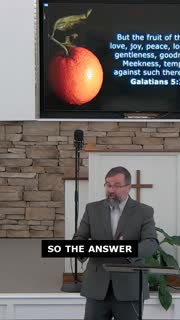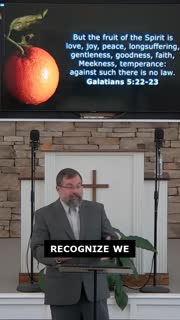Living by the Spirit: Transforming Flesh into Fruit
Devotional
Sermon Summary
Bible Study Guide
Sermon Clips
### Quotes for Outreach
1. "We live in a world, it seems like, that they're not wanting to name things out. If you name the name of Christ, we're all going to make it. But the scripture says, if we name the name of Christ, we need to depart from iniquity. And the scripture is very clear here. If we do these things, we will not inherit the kingdom of God." [01:35] (22 seconds)
2. "The fruit of the Spirit is a result of the Lord in our life. So, if there are some of these attributes, and we'll read through them, but if there's some of these attributes, then we'll read through them. But if there's some of the fruit of the Spirit that I am lacking in, what is the answer to yield to the Lord, and instead of biting my lip, if I'm frustrated, instead of biting my lip, what should I do? Yes, pray." [08:29] (31 seconds)
3. "The fruit of the Spirit is not something that comes by nature, but it's by the divine influence and power of the Holy Spirit working in our life. And so this is the product or the result or the fruit of a sanctified life, of a soul that has been purified and cleansed. And then as we yield more to the Lord, we do grow in these things." [10:13] (30 seconds)
4. "So the answer to having the fruit of the Spirit to be more like Christ is to yield more to Him. I'm ceasing from my labors, and it's the fruit of the Holy Spirit in my life that's coming out. And that doesn't mean that we shouldn't say, Lord, I need some more gentleness, and be aware of the needs in our life, but how do we get it? As has been said, by submitting to the Lord." [08:29] (26 seconds)
5. "So the first one is love. Someone defined love for us. A result of a pure heart, love. I know there's multiple definitions of love, but it's that intense desire to please God here, isn't it? The fruit of the Spirit, you want to see someone has love. It's that desire more than anything else. Lord, I want to please you." [12:13] (36 seconds)
### Quotes for Members
1. "The works of the flesh. This is the flesh. It's talking about depraved mankind. Okay. Sin passed on the whole world when Adam and Eve sinned. It did something morally in all of us. So, maybe it, it, it really changed our moral character or makeup with the sin of Adam and Eve. There was something lost, and it wasn't just the innocence." [03:23] (30 seconds)
2. "So, when it uses the word flesh here, I want us to understand, it's not talking about this flesh and blood. It's talking about the fleshly nature of mankind. Okay. Some refer to it as the old man, and we talked about that last time. This is what the scripture calls it. The old man or the flesh. In Galatians, he used the word flesh." [04:58] (25 seconds)
3. "So, if we are adulterers, idolaters, fornicators, liars, cheaters, all of those things are on that list, that is going to preclude us from entering into heaven. Because what's not right if we're doing those things? Our hearts aren't right. So, we're not saved by, keeping the law. Again, that's the whole point of this. We're not saved by keeping the law, but these are some of the works of the flesh." [01:35] (29 seconds)
4. "So, part of the evidence and the fruit of the spirit in our life is going to be temperance, self-control. Then he said, against such there is no law. So people can have, if you had all of this fruit working in your life, Paul was, letting them know, he said, there's no law. You can't be condemned by any law. The moral law of God, the moral law of God is fulfilled and evidenced by those that have the fruit of the spirit." [19:21] (34 seconds)
5. "So, when we recognize we have a need, the answer is still the same. Lord, help me to get closer to you. Help me to draw closer to you. All right, what about gentleness? What's gentleness? It's not harshness. The word actually is translated as kindness in some translations in this context. Gentleness being kindness or moral excellence. Just being kind. Kind to people. That is a fruit of the Spirit." [14:44] (37 seconds)
Ask a question about this sermon
1. "We live in a world, it seems like, that they're not wanting to name things out. If you name the name of Christ, we're all going to make it. But the scripture says, if we name the name of Christ, we need to depart from iniquity. And the scripture is very clear here. If we do these things, we will not inherit the kingdom of God." [01:35] (22 seconds)
2. "The fruit of the Spirit is a result of the Lord in our life. So, if there are some of these attributes, and we'll read through them, but if there's some of these attributes, then we'll read through them. But if there's some of the fruit of the Spirit that I am lacking in, what is the answer to yield to the Lord, and instead of biting my lip, if I'm frustrated, instead of biting my lip, what should I do? Yes, pray." [08:29] (31 seconds)
3. "The fruit of the Spirit is not something that comes by nature, but it's by the divine influence and power of the Holy Spirit working in our life. And so this is the product or the result or the fruit of a sanctified life, of a soul that has been purified and cleansed. And then as we yield more to the Lord, we do grow in these things." [10:13] (30 seconds)
4. "So the answer to having the fruit of the Spirit to be more like Christ is to yield more to Him. I'm ceasing from my labors, and it's the fruit of the Holy Spirit in my life that's coming out. And that doesn't mean that we shouldn't say, Lord, I need some more gentleness, and be aware of the needs in our life, but how do we get it? As has been said, by submitting to the Lord." [08:29] (26 seconds)
5. "So the first one is love. Someone defined love for us. A result of a pure heart, love. I know there's multiple definitions of love, but it's that intense desire to please God here, isn't it? The fruit of the Spirit, you want to see someone has love. It's that desire more than anything else. Lord, I want to please you." [12:13] (36 seconds)
### Quotes for Members
1. "The works of the flesh. This is the flesh. It's talking about depraved mankind. Okay. Sin passed on the whole world when Adam and Eve sinned. It did something morally in all of us. So, maybe it, it, it really changed our moral character or makeup with the sin of Adam and Eve. There was something lost, and it wasn't just the innocence." [03:23] (30 seconds)
2. "So, when it uses the word flesh here, I want us to understand, it's not talking about this flesh and blood. It's talking about the fleshly nature of mankind. Okay. Some refer to it as the old man, and we talked about that last time. This is what the scripture calls it. The old man or the flesh. In Galatians, he used the word flesh." [04:58] (25 seconds)
3. "So, if we are adulterers, idolaters, fornicators, liars, cheaters, all of those things are on that list, that is going to preclude us from entering into heaven. Because what's not right if we're doing those things? Our hearts aren't right. So, we're not saved by, keeping the law. Again, that's the whole point of this. We're not saved by keeping the law, but these are some of the works of the flesh." [01:35] (29 seconds)
4. "So, part of the evidence and the fruit of the spirit in our life is going to be temperance, self-control. Then he said, against such there is no law. So people can have, if you had all of this fruit working in your life, Paul was, letting them know, he said, there's no law. You can't be condemned by any law. The moral law of God, the moral law of God is fulfilled and evidenced by those that have the fruit of the spirit." [19:21] (34 seconds)
5. "So, when we recognize we have a need, the answer is still the same. Lord, help me to get closer to you. Help me to draw closer to you. All right, what about gentleness? What's gentleness? It's not harshness. The word actually is translated as kindness in some translations in this context. Gentleness being kindness or moral excellence. Just being kind. Kind to people. That is a fruit of the Spirit." [14:44] (37 seconds)










